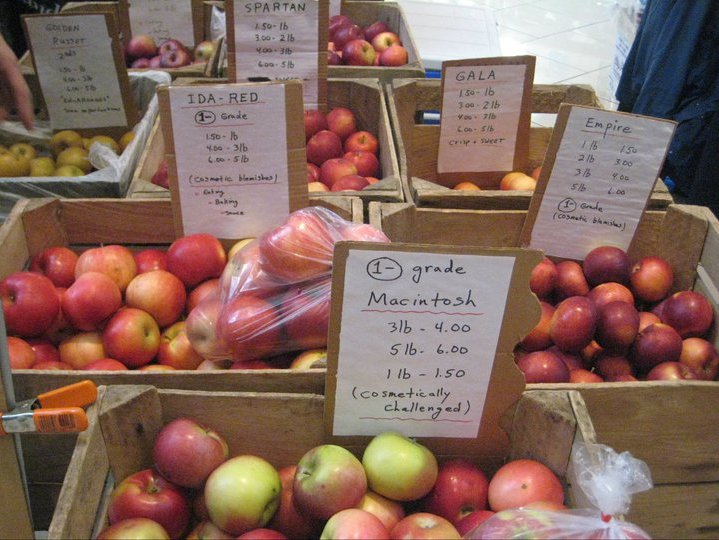It's getting to be that time of the year again – that glorious season when farmers market stalls are bursting with delicious fruits and vegetables. It's the time of year when you can pick up all the ingredients for the biggest, freshest BLT you've ever eaten, all in one place.
But, even at the height of harvest season, how do you get the most from that trip to the farmers market? Here are a few tips to help you on your way.
Arrive early for the best selection. Take care, though, not to go too early. Some markets restrict sales prior to opening, so you don't want to contribute to a violation of policy. It's also a matter of courtesy to allow the farmers to get their booths set up in an orderly fashion prior to the onslaught of eager patrons.
Arrive late to beat the crowds. As an added bonus, you may find that some farmers discount their produce as much as 20 percent by the end of the market so they don't have to haul it back to the farm. Don't be afraid to ask if the farmer provides such a discount (or a discount for buying in bulk); but, by the same token, remember that this is his or her livelihood, so don't expect to get produce for free.
Don't rush. One of the charms of any farmers market is the pace. Take the time to meander around the market, getting to know what farmers have to offer. Grab a cup of coffee and give the stalls a once-over before choosing your produce. Appreciate the beauty of the ultra-fresh leaves, the roots, the seeds and the fruit.
Carry cash, and bring more than you think you'll need. It helps to have small bills and change so that you can offer the vendors exact currency. If prices seem higher than at a big supermarket, don't complain. Be thankful that you have access to some of the best, freshest produce in the area. And bask in the variety of types of produce you can purchase at the market; it's something you'll never see at even the finest of grocery stores.
Bring large cloth bags with comfortable shoulder straps. Not only will you be sparing another plastic bag, but you'll also experience the comfort of being able to lug your delicious finds around the market without juggling multiple small bags. While you're at it, be sure to take back and reuse packaging, such as berry baskets and egg cartons. Many farmers will reuse berry baskets and produce containers if you return them.
Put a cooler in your car for products that need to stay cold. Markets are perfect places to find fresh produce, but they can also be great sources for dairy products, meats and other products that prefer to be kept cold. Come prepared and you'll ensure that your milk won't curdle, lettuce won't go limp, berries won't turn to mush and your frozen meat won't thaw out before you get home.
Be flexible. Strict meal planning has its perks, but taking advantage of produce when it's at the peak of its season has flavorful advantages. Buy what looks freshest and best. And plan for some spontaneous purchases so that you don't miss out on summer delights like that pint of fresh raspberries or ground cherries you didn't expect to find.
Ask the farmers questions. You have food experts standing right in front of you. Take advantage of that. Developing personal relationships with farmers can be one of the top benefits of shopping at the farmers market. You'll get to know more about where the farms are located, how their crops are grown and what makes their produce different from that at other market stands. You'll also have the unique opportunity to share in their victories (bumper tomato crops) or challenges (crop failure in 100-degree heat), giving you a better understanding of the journey your food makes to the market.
Get to know the local growing season. Farmers are always ready and willing to give you information about what they're growing and when to expect the next crop. It's always a pleasure to know when certain foods are in their prime so that you can look forward to their arrival. Plus, if you're on a budget or committed to eating locally, it pays to note when certain produce will be arriving at the market so that you can plan accordingly. After all, when you know to expect fresh peaches in the next week or two, you can plan ahead for stocking your freezer, making time for canning or simply looking forward to that first delicious juicy bite of local deliciousness.
Buy something you've never eaten before. Snap up that beautiful bunch of kale, take it home and roast it into kale chips. Buy a basket of currants to infuse your own vodka for cocktails. Or simply try out a new variety of cauliflower or tomatoes. Better yet, ask a farmer (or fellow market-goers) for suggestions on how to prepare your new find.
As a passionate champion of the local dining scene, Lori has reimagined the restaurant critic's role into that of a trusted dining concierge, guiding food lovers to delightful culinary discoveries and memorable experiences.
Lori is an avid cook whose accrual of condiments and spices is rivaled only by her cookbook collection. Her passion for the culinary industry was birthed while balancing A&W root beer mugs as a teenage carhop, fed by insatiable curiosity and fueled by the people whose stories entwine with every dish. Lori is the author of two books: the "Wisconsin Field to Fork" cookbook and "Milwaukee Food". Her work has garnered journalism awards from entities including the Milwaukee Press Club. In 2024, Lori was honored with a "Top 20 Women in Hospitality to Watch" award by the Wisconsin Restaurant Association.
When she’s not eating, photographing food, writing or planning for TV and radio spots, you’ll find Lori seeking out adventures with her husband Paul, traveling, cooking, reading, learning, snuggling with her cats and looking for ways to make a difference.







